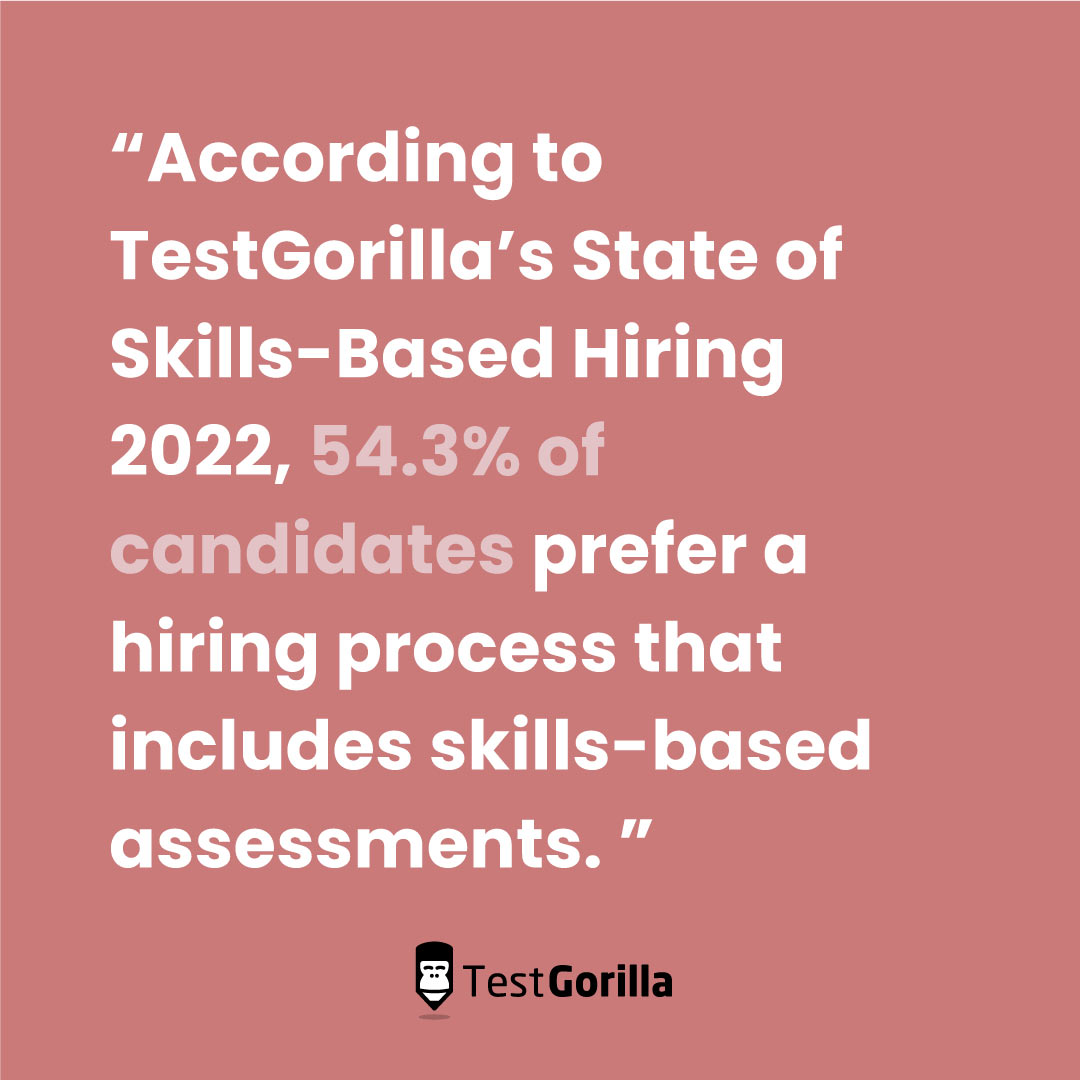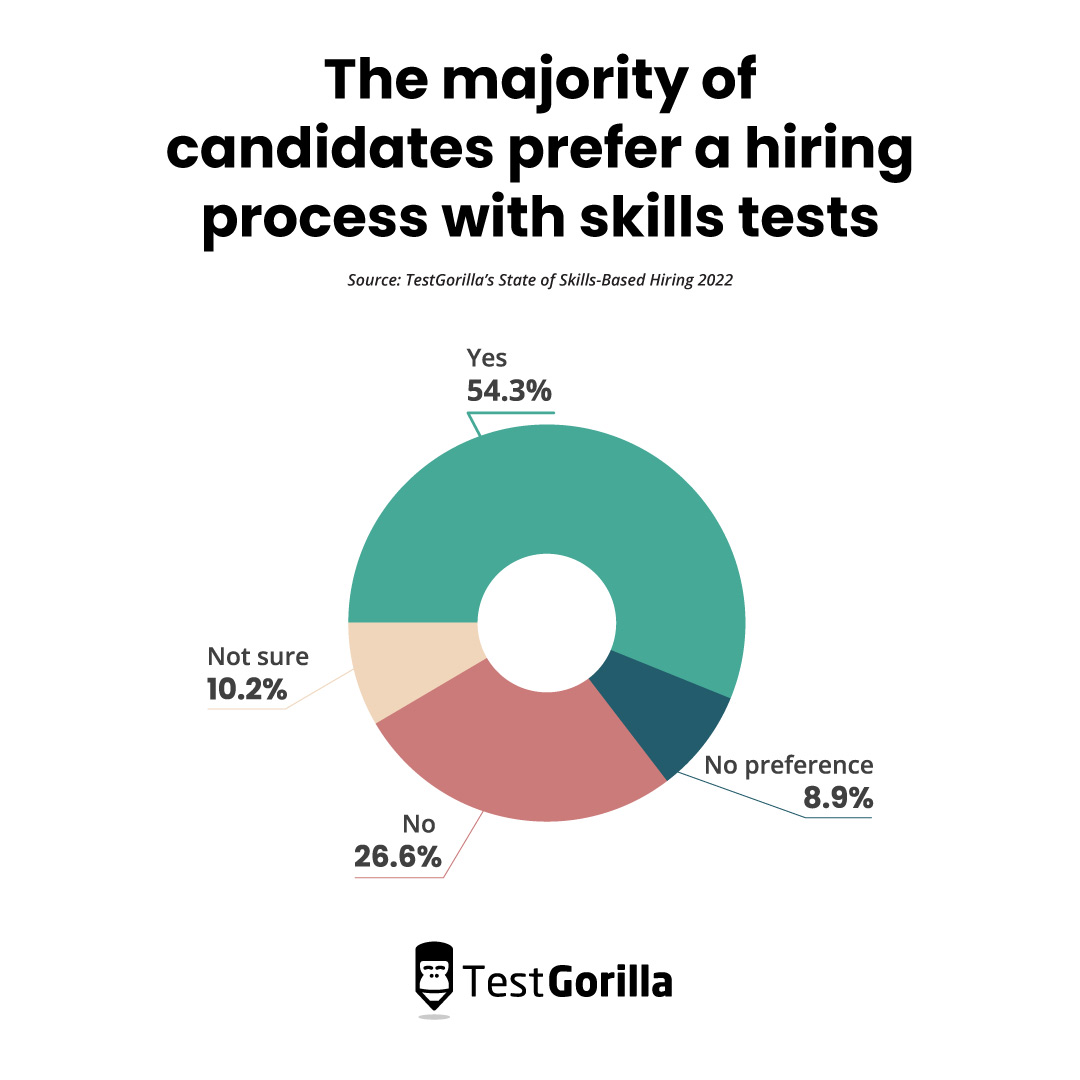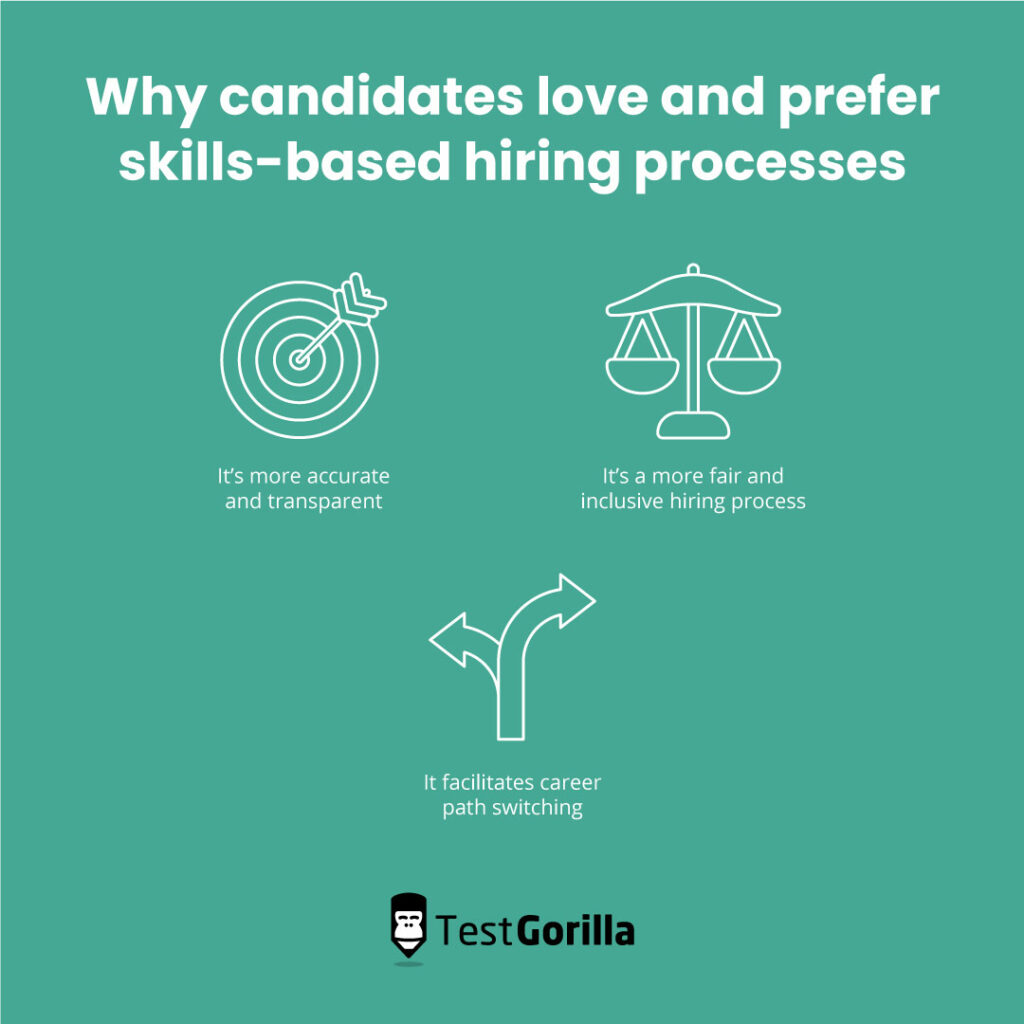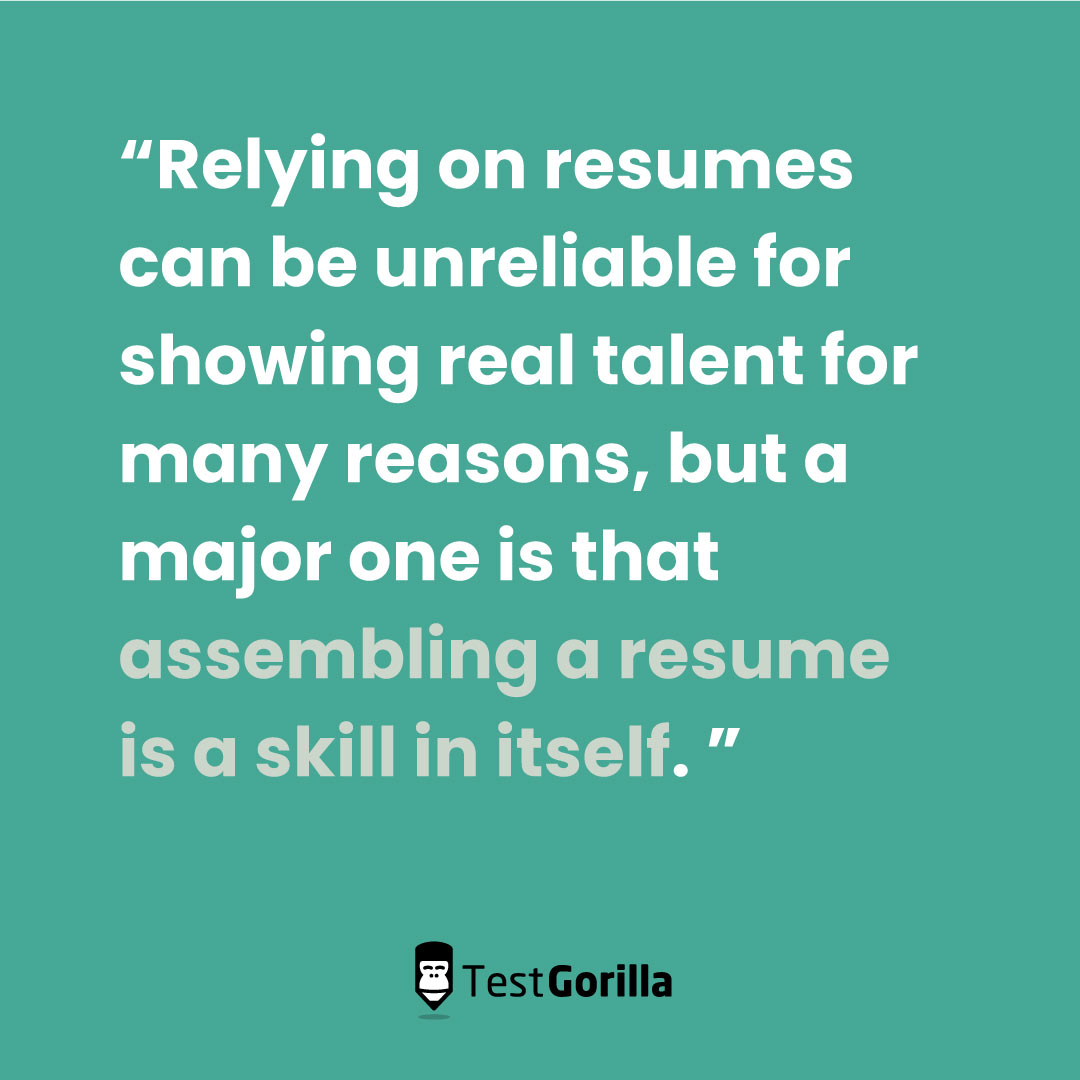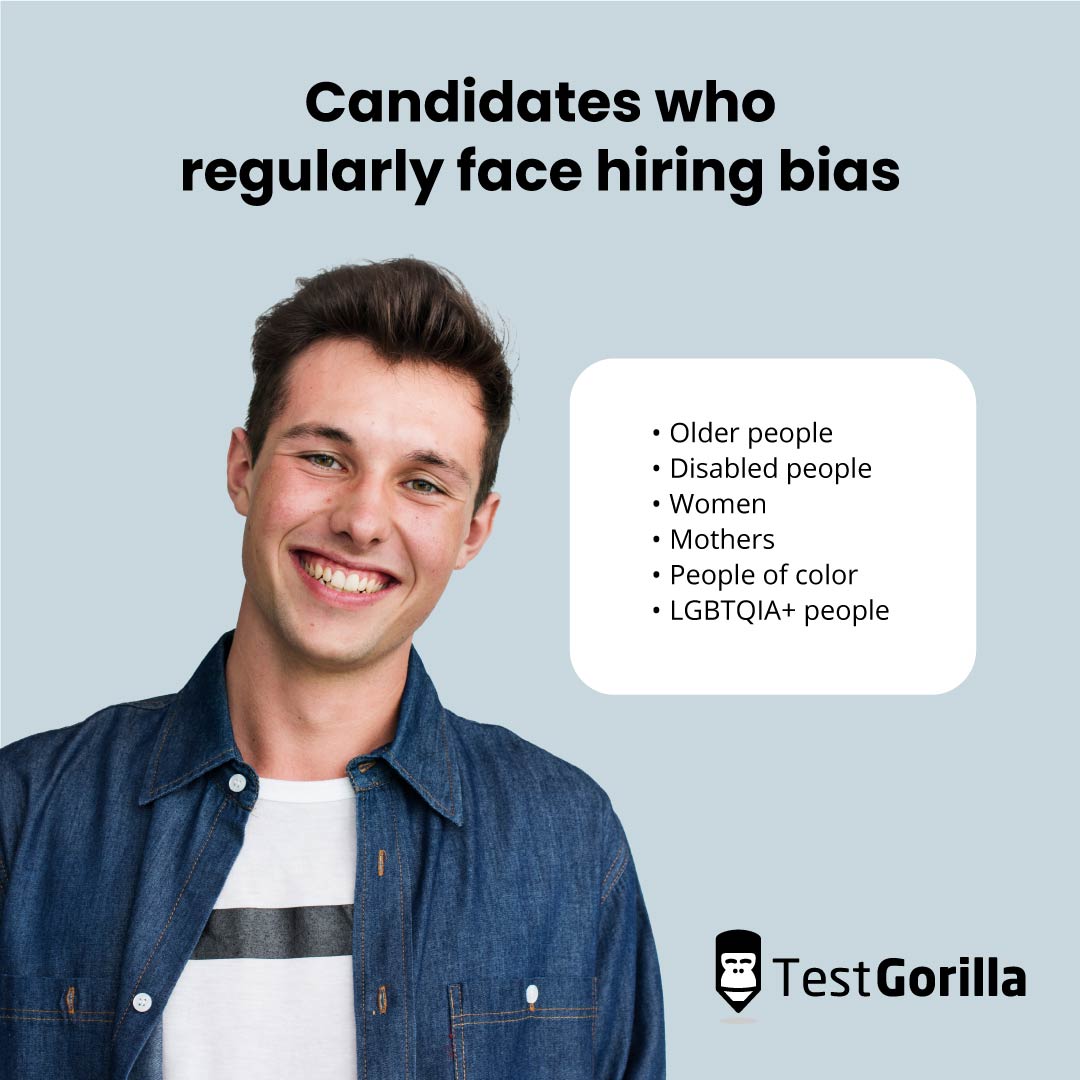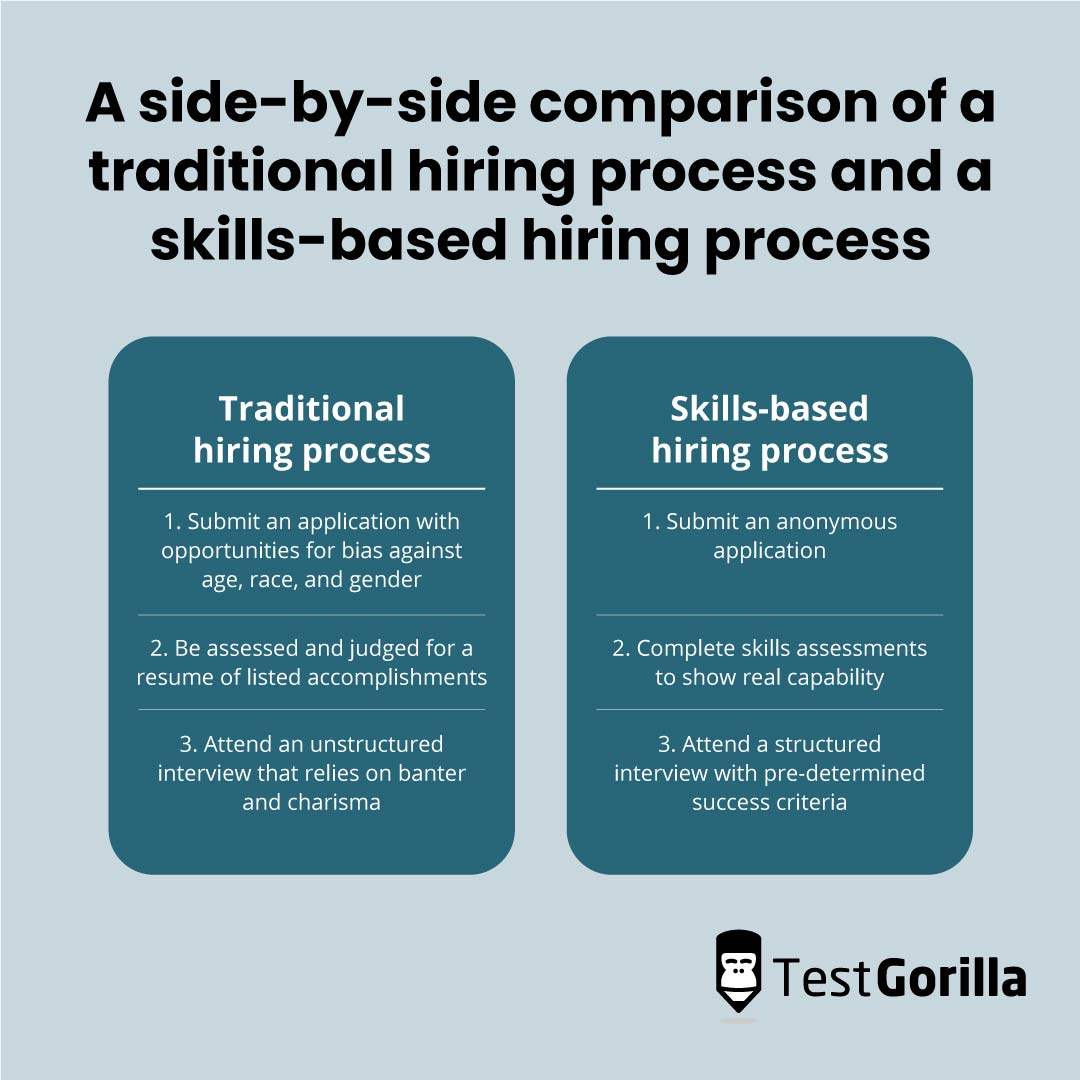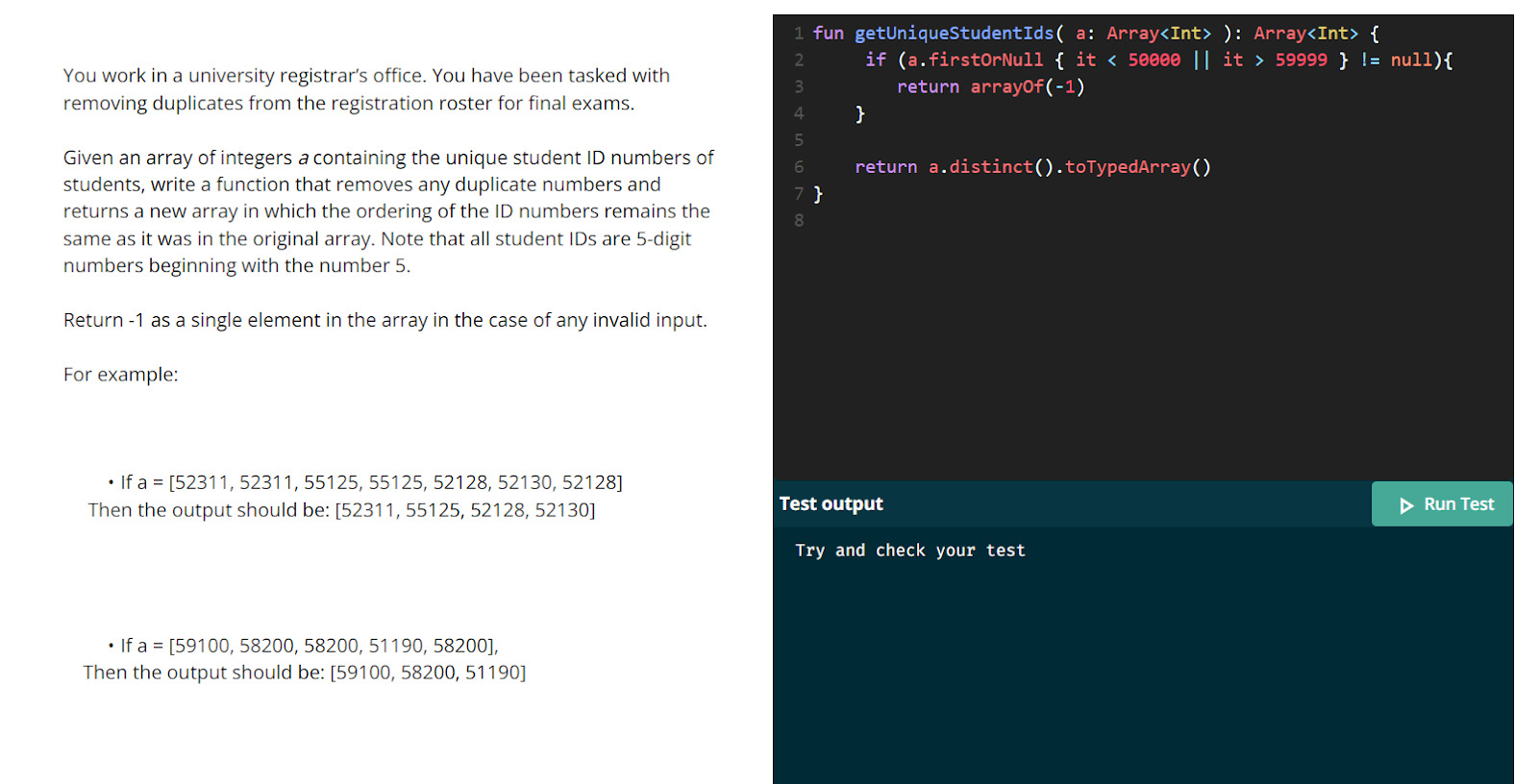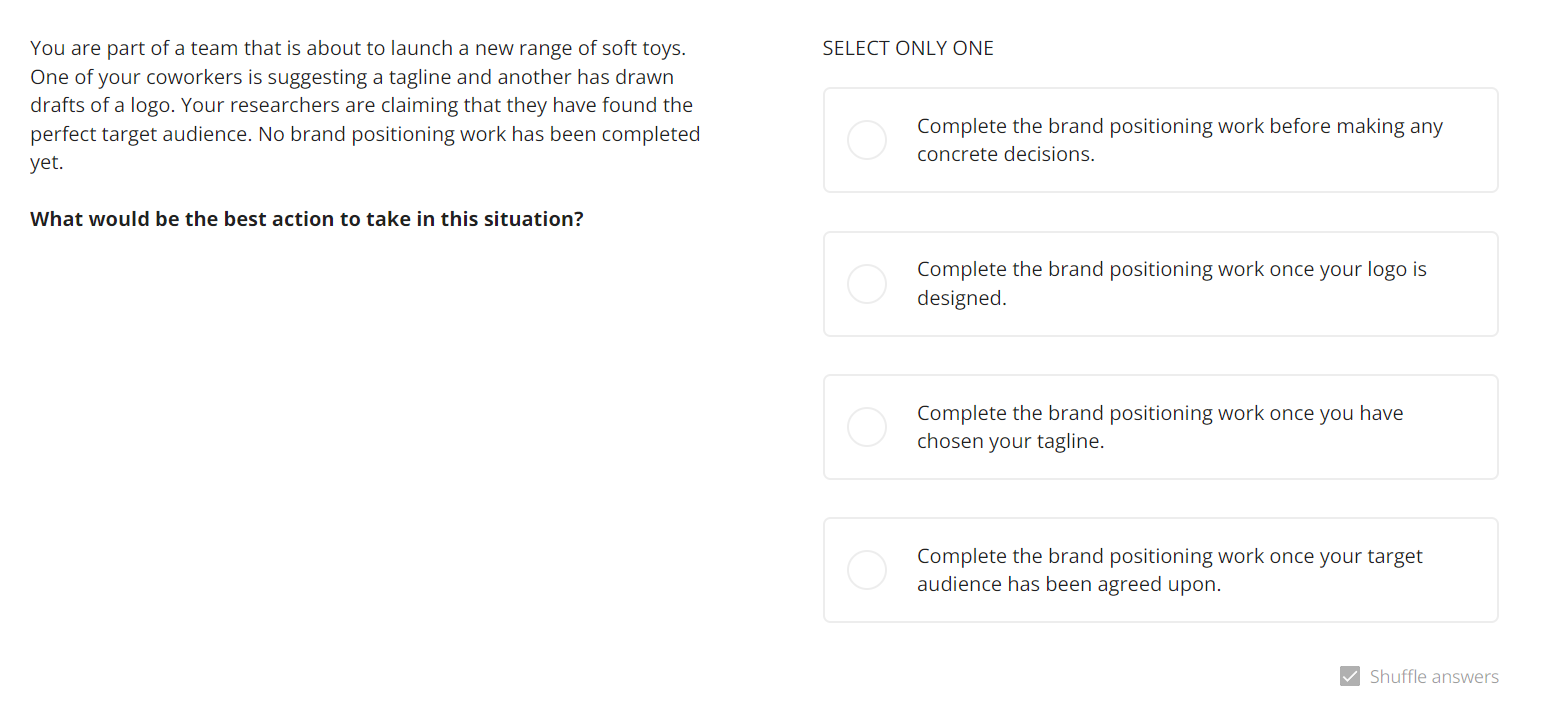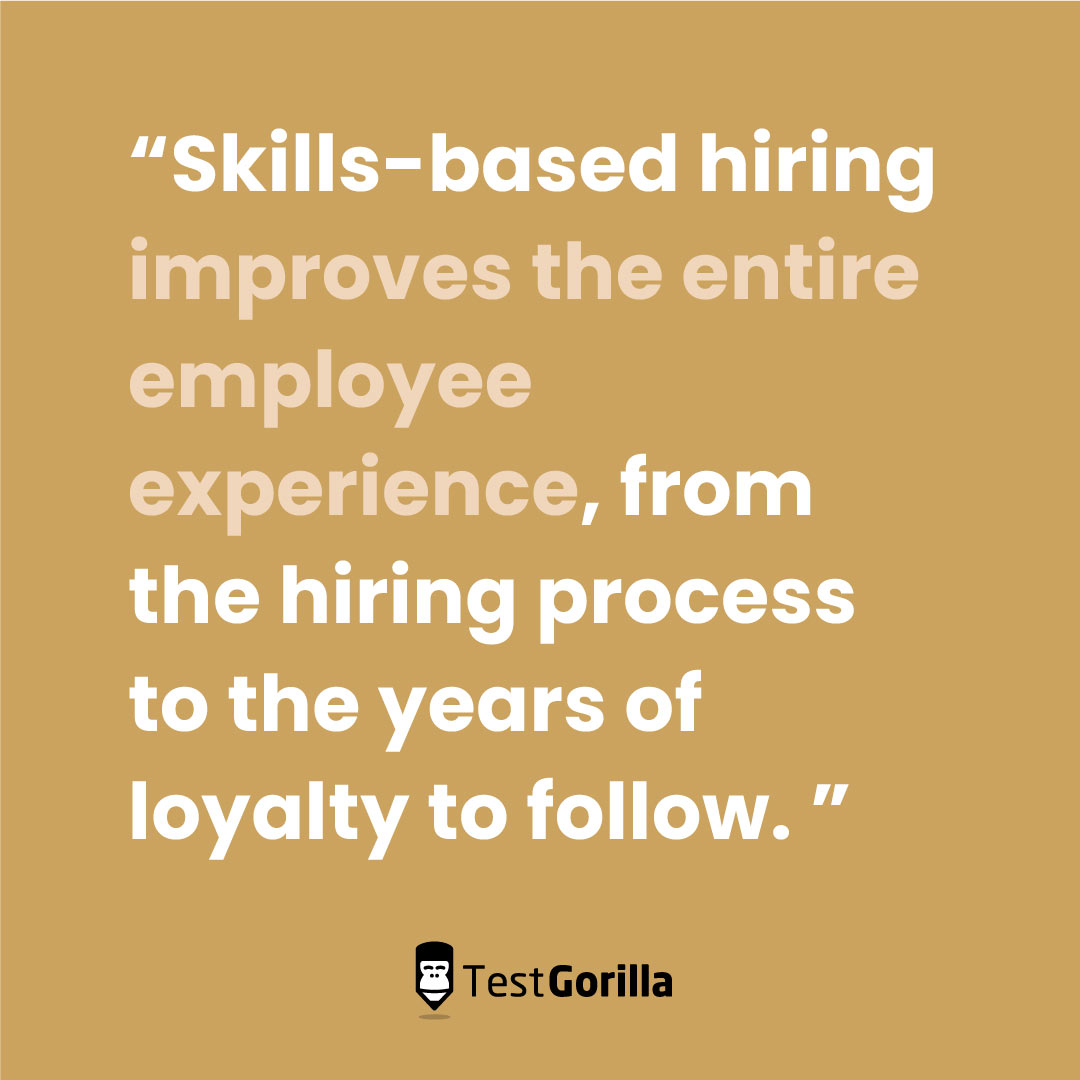A skills-based hiring process focuses on a candidate’s capabilities, which reduces reliance on resumes (or even excludes them completely).
We’ve discussed the benefits of skills-based hiring from an employer’s point of view many times, but what do your candidates think of it?
According to TestGorilla’s State of Skills-Based Hiring 2022, 54.3% of candidates prefer a hiring process that includes skills-based assessments.
This data isn’t surprising when you consider the difficulties that come with a traditional hiring process.
Imagine submitting an outdated resume that doesn’t show your real ability and then going through an interview that doesn’t even focus on role-relevant skills. So much is at stake during a job application, but so rarely does it feel like success stems from what you’re actually capable of.
No wonder so many candidates are disillusioned with the hiring process.
This article discusses skills-based hiring from a candidate’s perspective: why the majority love it, why some oppose it, and how assessing skills can improve the candidate experience.
Table of contents
- The majority of candidates prefer skills-based hiring
- Why candidates love skills-based hiring
- A skills-based hiring process from the candidate’s perspective
- Why do some candidates oppose it?
- How skills-based hiring improves the candidate experience
- Switch to skills-based hiring and do what candidates prefer
- Sources
The majority of candidates prefer skills-based hiring
Many employers are already seeing higher quality hires and increased diversity through skill-based hiring, but now we know the whole picture: Candidates want skills-based hiring, too.
TestGorilla’s State of Skills-Based Hiring 2022 report showed that the majority of candidates prefer a hiring process with skills tests.
Here are the results out of the 2,666 employees we surveyed:
1,448 of them (54.3%) prefer a hiring process that includes skills-based assessments
26.6% answered that they preferred hiring processes without assessments
10.2% said they weren’t sure
8.9% had no preference when it comes to hiring processes
There are many possible reasons for this preference. Skills-based hiring offers higher transparency, reduces bias, and facilitates career switching and growth.
Rashid Lansah, a TestGorilla employee who was hired with skills testing, cites career switching as the primary reason that he loves skills-based hiring and skills assessments.
“As an employee who came from a biochemistry background but developed different skills in product design, UI/UX and web design, and IT customer support, I’d prefer to apply and work for employers that use skills-based assessments.”
Rashid goes on to say that from his perspective, a company that prioritizes skills over experience and degrees truly values what an employee can do. This mentality also expands professional development and growth opportunities.
So, what’s up with the 26.6% that don’t prefer skills assessments?
Candidates could have several reasons to hold this opinion:
Resenting a switch in traditional processes
Preferring resumes
Finding tests annoying
Are insecure of their skills
A lot of the negativity surrounding skill-based hiring can be explained by the most common response to change: It’s different and will take some getting used to.
And what about the 19.1% who weren’t sure either way?
This number represents the possibility that some candidates are completely indifferent to the hiring process. Do the specifics of a hiring process even matter to some people? Or, do they see it as simply an HR trend that they’ll go along with?
To some candidates, resumes were just a hoop to jump through to secure a great job, so maybe they feel the same about skills assessments. Regardless, someone feeling indifferent about something shouldn’t influence your decision of implementing it if the majority of candidates support it.
Why candidates love skills-based hiring
Let’s discuss the main reasons why candidates love and prefer skills-based hiring processes:
It’s more accurate and transparent
It’s a more fair and inclusive hiring process
It facilitates career path switching
A hiring process that puts emphasis on talent, capability, and responsibility is a hiring process that focuses on what’s important with little room for bias.
Isn’t that what every candidate should want?
Skills-based hiring is more accurate and transparent
Many candidates appreciate a company that focuses on skills simply because it’s more transparent and accurate.
Nicole Roberts, the senior vice president of people at Forta, told TestGorilla much the same.
“People want to be authentic and find alignment with their skills and experience, but language and verbiage vary.”
She says that a poorly crafted job posting may cause the wrong candidates to apply, causing applicants to try to fit the mold based on what they think the job is based on the description.
This can lead to a sharp contrast between a candidate’s expectations versus reality.
Many candidates then end up in a role they aren’t suited for because of a lack of transparency throughout the hiring process.
Nicole goes on to say that skills-based hiring helps candidates add to the company as their natural selves. This enables them to match the job to their work style, rather than the other way around, which leads to better job satisfaction.
Candidates also appreciate the accuracy that skills assessments bring to the table.
Relying on resumes can be unreliable for showing real talent for many reasons, but a major one is that assembling a resume is a skill in itself.
It’s so daunting, in fact, that many job seekers feel the need to hire a resume “ghostwriter” just to be competitive.
The problem is that a candidate’s resume construction often has little to do with what they bring to the table. For example, a programmer is excellent at what they do, but has no idea how to put together the “right” resume because that requires talent in writing and layout.
But do you need your new programmer to be a skilled writer and designer? No. So, how is a well-built resume going to show their actual skills?
Focus on skills and reduce bias
When you focus on skills over experience and degrees, it almost eliminates hiring bias completely.
Because skills-based hiring reduces bias drastically, it’s possible that many of the aforementioned 54.3% of candidates that prefer skills tests belong to marginalized groups.
Candidates who regularly face hiring bias include:
Older people: Age discrimination in hiring is real and rampant. Older workers are up to three times less likely to be selected for a job interview.
Disabled people: Countless disabled people are discriminated against in the hiring process. For example, the autism spectrum disorder employment gap is one of the largest across all disability groups.
Women: The gender employment gap is still disappointingly large, and women sometimes have to use tactics like using a male name to get application responses.[1]
Mothers: The motherhood penalty is when employers question the experience, dedication, and competence of mothers in the workplace.
People of color: Bias affects millions of candidates of color who face many issues such as name discrimination on applications.
LGBTQIA+ people: Nearly half of LGBTQIA workers have faced discrimination in their careers, including being passed over for a job.
This isn’t even addressing intersectionality and the cumulated bias that people face when they fall into two or more of these groups. These candidates benefit greatly from skills assessments, so they can’t help but see it more positively.
Another group that benefits from reduced hiring bias is anyone who lacks the “right” background, education, and experience.
Candidates without years of experience or a four-year degree may not even get past the application stage. Skills-based assessments enable them to get further into the hiring process and give them a chance to display their capability.
It isn’t abnormal for top talent to lack experience and degrees. These candidates are known as STARs (skilled through alternative routes).
Many of the most successful people in the world, such as Bill Gates and Steve Jobs, were college dropouts. If they’re not already starting their own businesses, you wouldn’t want to miss out on hiring one such individual for yourself.
Many STARs are also from the marginalized groups mentioned above:
61% of Black workers
55% of Hispanic workers
61% of Veteran workers
The hiring bias around these candidates rises even higher, so reducing it with skills testing can be an absolute lifesaver for countless talented individuals.
Skills-based hiring empowers new career paths
What good is a four-year degree and 10 years of experience in sales when you’re trying to make the switch to project management?
Skills-based hiring enables candidates to make easier career changes, and they appreciate it.
There are many individuals who have experience from hobbies or volunteering that decide to pursue the field as a full-time career. These people are highly skilled, but have no “work” experience, even though they do have experience.
Grace Myers, the social media manager at Wix, was able to make a successful career switch thanks to skills-based practices.
After losing her job, Grace scraped by on savings as she built her skills volunteering as a social media manager. Her success enabled her to score a full-time marketing job while her degree was in International Relations.
Grace ends her post by stressing that you don’t need a specific degree or any degree at all to find your dream job. The skills you teach yourself are all you need and can take you to amazing places.
Candidates appreciate when recruiters focus on skills because if you can spend your life honing a specific skill, but an employer only looks at your degrees and experience, you’ll never make it past the application stage.
A skills-based hiring process from the candidate’s perspective
Let’s take a look at the hiring process from the candidate’s perspective so we can truly understand why candidates love skills-based hiring.
Here’s a side-by-side comparison of a skills-based hiring process and a traditional hiring process:
Traditional hiring process | Skills-based hiring process |
Submit an application with opportunities for bias against age, race, and gender | Submit an anonymous application |
Be assessed and judged for a resume of listed accomplishments | Complete skills assessments to show real capability |
Attend an unstructured interview that relies on banter and charisma | Attend a structured interview with pre-determined success criteria |
You can see what we mean.
The traditional process leaves too much room for bias and cracks wide enough for top talent to slip through.
Let’s take a look at what your candidates see when they take a skills assessment:
This question is taken from our Kotlin Coding test.
When a candidate applies for a coding job and is faced with a real coding test, they’re assured that this job cares about their capability – not a well-written resume.
What about assessments for roles that can’t use real work samples?
This is a question from our Branding Strategy test. It isn’t as direct and hands-on as the coding test, but rather is based on behavioral and situational circumstances.
At the end of the day, it doesn’t matter if your marketer has years of experience if they wouldn’t have the best response to a marketing situation.
Skills tests like these ensure there aren’t surprises on either end when it comes to their first day of work. They give your candidates real transparency over what work to expect and what the role is like.
Why do some candidates oppose it?
Let’s take another look at the 26% of candidates that prefer a hiring process without skills tests.
There are plenty of reasons why some people would rather not take skills tests, such as preferring resumes and resenting change. Some people also claim to simply be “bad test-takers.”
We believe the biggest reason is unfamiliarity. Change can be intimidating, and people used to the old system aren’t sure where to begin with skills-based hiring.
There are a lot of new questions that candidates have to ask themselves:
“How do I display my skills?”
“How do I describe my skills in a resume? Do I need to?”
“Am I as skilled at this as I think I am?”
Christopher Taylor, a recruiting consultant, says much of the resistance is due to unfamiliarity.
Christopher says that skills-based hiring requires candidates to take inventory of their skills and push them front and center.
“And that’s something that a lot of people have trouble doing…”
However, he goes on to say that it’s something that everyone can do regardless of industry or role.
Many candidates who oppose skills testing are also secure in their resumes and successful in the current climate. Why should they want change?
There’s also an unfortunate amount of people who have well-written, impressive-looking resumes, but aren’t as qualified for the role as their resume may lead you to believe. People like this may be uncertain about a skills-based hiring process.
The people who see the immediate benefit of skills tests are those who have trouble with work history, struggle against bias, and don’t have a “strong enough” resume.
Peter Hansen, an account effective at Wisq, believes some resistance to skills tests could come from phrases like “degrees don’t matter” or “degrees are overrated.”
Peter personally believes degrees shouldn’t be a requirement for most positions, but these phrases may demean the work individuals go through in order to earn that degree.
He suggests hiring managers use the more inclusive “degrees aren’t required.” Of course, there are plenty of qualified people that do hold degrees, so there’s no sense in discouraging them from applying as well.
There could also be a number of people who prefer a traditional process simply because they don’t believe that companies take a skills-based process seriously.
A Deloitte study showed that 59% of workers say they believe their employers prioritize experience and degrees over skills. However, only 36% of executives actually say they prioritize experience and degrees over skills.
This shows that workers believe their employers prioritize degrees more than they actually do.
If candidates believe that employers still prioritize degrees and don’t take a skills-based process seriously, they may doubt the process is effective.
It should be noted that the same study showed that 73% of workers say skills-based practices would improve their experience. In addition,66% of workers say they would be more likely to be attracted to an organization that values skills rather than experience and degrees.
This means that much of the opposition can be counteracted by wearing your values on your sleeve and loudly proclaiming that you’re an organization that takes skills tests seriously, uses the best practices, and assesses candidates fairly.
How skills-based hiring improves the candidate experience
We’ve taken a look at the candidate’s perspective during a skills-based hiring process – but how exactly does it improve the hiring experience?
Skills-based hiring plays an important role in improving the candidate experience as a whole. It makes hiring a fairer, more transparent, and more accurate process, leading to better results and happier employees.
Candidates have always prioritized speed, communication, and transparency from a prospective employer. These points are hard to achieve with traditional hiring processes.
For example, skills assessments make it easy for hiring managers to quickly access qualifying data, tremendously boosting the efficiency of the process.
Assessments with clear results make the selection criteria clear to applicants, so there isn’t a doubt about where they hit and where they missed.
If you choose to share the candidate’s results with them, they get to see the real percentages of their assessment, giving them valuable, transparent feedback. They may even want to hone their skills and apply again when they’re ready and qualified!
A skills-based hiring process can also improve the employee experience.
Happy candidates that have a positive candidate experience can then transition to happy employees. The hiring process is a crucial first impression for the overall employee experience.
Our State of Skills-Based Hiring report showed that 72.1% of those hired using skills-based hiring were either “happy” or “very happy” in their current role, compared to 62.9% of those who were recruited via other methods.
This means that skills-based hires are about 15% more likely to be satisfied in their role than traditional hires. Ultimately, happier employees are more productive than unhappy employees.
Beyond transparency and communication, this increase in happiness could come from candidates getting a taste of what the role will entail and whether or not they’ll enjoy it before they accept a job offer.
The satisfaction from a skills-based hiring process can also be tied to personality and culture assessments. These tests evaluate crucial factors that help align candidates to an organization.
When employers can understand factors like motivation, values, and lifestyle, it enables both parties to determine how happy a candidate might be in a certain position.
Tests like our Culture Add test also ensure a candidate makes an excellent addition to your specific organizational culture.
Skills-based hiring improves the entire employee experience, from the hiring process to the years of loyalty to follow.
Our survey showed that expected voluntary attrition is 50% lower for people recruited using skills-based hiring.
Only 3.2% of employees hired using this method plan to leave their roles in the next 12 months, compared with 7.3% of employees who were not recruited via skills-based hiring.
Switch to skills-based hiring and do what candidates prefer
Skills-based hiring carries many benefits for your organization, and now we know that one of them is “candidates prefer it.”
Your potential candidates want reduced bias, improved accuracy and transparency, and easier career path switching.
They want to be assessed and evaluated for the work they do and how well they do it – not an outdated resume or a handshake.
Skills-based hiring is just another stepping stone to creating a more fair and effective recruiting world, so it’s good to know candidates support it, too.
Sources
Gaetano, Chris. (June 8, 2016). “Woman Who Switched to Man’s Name on Resume Goes From 0 to 70 Percent Response Rate”. NYSSCPA. Retrieved January 25, 2023. https://www.nysscpa.org/news/publications/the-trusted-professional/article/woman-who-switched-to-man’s-name-on-resume-goes-from-0-to-70-percent-response-rate-060816
Related posts
Hire the best candidates with TestGorilla
Create pre-employment assessments in minutes to screen candidates, save time, and hire the best talent.
Latest posts
The best advice in pre-employment testing, in your inbox.
No spam. Unsubscribe at any time.

Hire the best. No bias. No stress.
Our screening tests identify the best candidates and make your hiring decisions faster, easier, and bias-free.
Free resources
This checklist covers key features you should look for when choosing a skills testing platform
This resource will help you develop an onboarding checklist for new hires.
How to assess your candidates' attention to detail.
Learn how to get human resources certified through HRCI or SHRM.
Learn how you can improve the level of talent at your company.
Learn how CapitalT reduced hiring bias with online skills assessments.
Learn how to make the resume process more efficient and more effective.
Improve your hiring strategy with these 7 critical recruitment metrics.
Learn how Sukhi decreased time spent reviewing resumes by 83%!
Hire more efficiently with these hacks that 99% of recruiters aren't using.
Make a business case for diversity and inclusion initiatives with this data.

